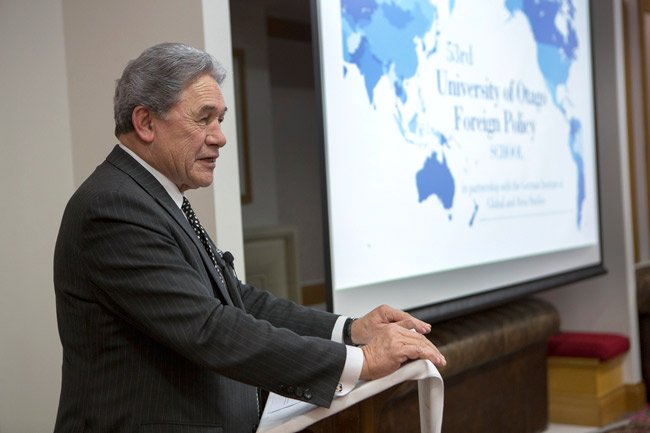Tuesday 3 July 2018 7:06pm

Acting Prime Minister and current Foreign Minister the Rt Hon Winston Peters opened the University of Otago's 53rd Foreign Policy School on Friday night. Photo: Sharron Bennett.
"While it is customary for the New Zealand Foreign Minister to give an opening address at the School, Mr Peters’ speech marked a historic moment in the development of the School since it began in 1966."
The School was opened by Acting Prime Minister and Foreign Minister the Rt Hon Winston Peters, who gave a striking and challenging address on Friday evening, beginning a weekend of robust discussion around the theme of Asia-Pacific Diplomacy in Transition: Ideas, Issues and Institutions at St Margaret’s College.
This was just the second time in the School’s 53 year history that it has been opened by an elected official at the Prime Ministerial level – the last time was in 1985, when David Lange spoke at the school.
Professor Patman says this set the tone for an incredible event.
“While it is customary for the New Zealand Foreign Minister to give an opening address at the School, Mr Peters’ speech marked a historic moment in the development of the School since it began in 1966.
“The speech itself was striking. Mr Peters reaffirmed New Zealand’s commitment to a multilateral, rules-based system that upheld free trade and international human rights, but said New Zealand would have to become more active internationally to protect its values and interests on the international stage. No longer able to rely on old friends to uphold the international liberal order, New Zealand would have to reach out to like-minded states to both protect and strengthen a liberal order that is key to New Zealand’s national interests. This new approach involved allocating greater resources to the Ministry of Foreign Affairs and Trade and also deepening New Zealand’s involvement in the South Pacific region.”
"Starting with Mr Peters’ challenging address, I believe this School has played a significant role in helping to clarify our thinking about the role of New Zealand in the Asia-Pacific region at a time when the international order is at something of a crossroads."
With speakers from 11 countries, and nearly one half of the audience drawn from officials of government departments, the School worked to address the challenges facing the region, and explored five inter-related themes: The Diplomacy of US, China and India; the Diplomacy of Economics and Trade; Institutions and Regional Diplomacy; Civil Society Context: Autocracy, New Actors and Democratisation; and Security Dynamics of Contemporary Asia-Pacific.
Professor Patman says the feedback from those who attended has been “amazingly positive”, and believes this year’s conference came close to fulfilling the vision of the event’s founder, Arnold Entwistle.
“He believed the Otago Foreign Policy School should be a forum where academics, policy-practitioners and interested members of the public came together to debate and exchange ideas in order to nurture an intellectual capacity to pursue an independent foreign policy.
“Starting with Mr Peters’ challenging address, I believe this School has played a significant role in helping to clarify our thinking about the role of New Zealand in the Asia-Pacific region at a time when the international order is at something of a crossroads.”
Professor Patman says this year’s programme was put together with the help of Professor Patrick Koellner, Vice-President of GIGA and Director of the Institute of Asian Studies, Hamburg, and that its implementation owed a great deal to the “dedicated and outstanding” efforts of the Otago Foreign Policy Coordinator Balazs Kiglics, and an “energetic and enthusiastic team of volunteers drawn from Otago postgraduate students”.
